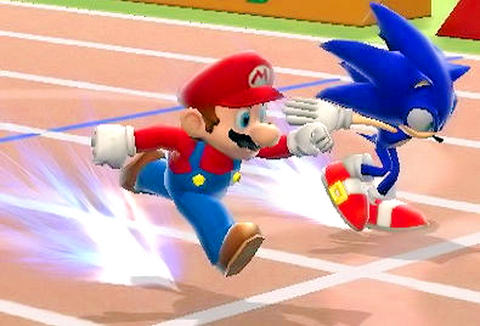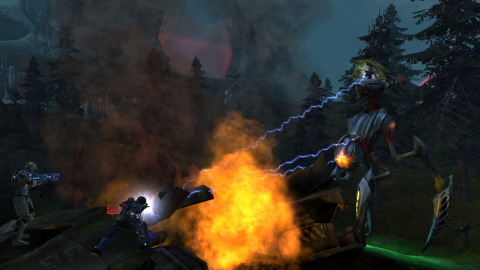After selling almost 200 million games over more than two decades and generating untold billions of US dollars in revenue for Nintendo of Japan, Mario is back with two new games. Super Mario Galaxy, released this month for Nintendo's Wii console, is the first major new Mario game in five years. Also, Mario shares top billing with his longtime rival Sonic the Hedgehog in a separate new game, Mario & Sonic at the Olympic Games.
Mario has always starred in games for everyone. So to test whether it could still appeal to an overeducated, media-saturated audience, I assembled a panel of non-gaming yuppies in their 30s at my house last weekend, put the Wii controls in their hands and sat back to check the reaction.
Judging by the hours of giggles, chortles and guffaws, Mario still has the goods and that incessant tug to play just five more minutes.

The reaction in my living room and elsewhere around the world indicates that Super Mario Galaxy is more than a worthy successor to the franchise's considerable legacy of smiles. It is being widely hailed as the best game yet for the Wii and is drawing plaudits from gamers and magazines alike.
Super Mario is generally a single-player game, but in a nice innovation, a second player can jump in and use a Wii remote to control a separate cursor on the screen that can stun enemies, pick up treasure and otherwise assist the main user controlling Mario. The game's whole feel is so finely tuned, so infectiously enjoyable, that it's understandable why Shigeru Miyamoto, Mario's creator, has been one of the most famous game designers in the world for decades.
My panel of non-experts had a lot of fun with the game's Olympic "events" (up to four can play at one time), especially the trampoline, but that game still is not receiving the praise being lavished on Super Mario Galaxy.

Richard Garriott's Tabula Rasa is another new game in an old series. How does it stack up?
The thing to understand is that playing a "massively multiplayer" online game, or MMO, is a commitment of money and time. MMO players routinely spend hundreds or even thousands of hours on their favorite games over many years. All of that time is an investment in building up the powers and abilities of one's virtual identity, not to mention the fun of adventuring with friends. For all that, players generally spend around US$15 a month.
Tabula Rasa is certainly a lot of fun, and it looks great. In an online gaming market deluged with dragons and elves, its fast-paced science-fiction combat is a refreshing change of pace. There are aliens descending all over the place and firefights stretching over gorgeously rendered landscapes.

Graphically, the game seems to take a page from Starship Troopers, with its bright colors and varied foes.
The big question is whether the game has enough depth to keep players coming back for months or years without devolving into a mindless repetition of "see alien, shoot gun, repeat."
Garriott and the rest of his team at NCsoft have been candid in saying that they are trying to appeal mostly to a broad base of casual gamers rather than to the smaller cadre of hard-core players who might spend 30 hours a week or more on a game.

More than four years after its debut, Eve Online is only now hitting its stride as one of the most interesting games in the world.
Eve takes place in a fictional galaxy in a far future, where humanity has splintered into four competing factions, the theocratic Amarr, the militaristic Caldari, the liberal Gallente and the rebel Minmatar. Players choose a side and find their own path.
At a stage when most games have long since stagnated, Eve continues to grow, recently passing 200,000 subscribers. CCP is planning a major graphics overhaul scheduled for Wednesday.
In many ways, Eve is like the real world. All 200,000 of Eve's players exist in one huge virtual galaxy spanning thousands of solar systems. About 40 percent of Eve's players are European, another 40 percent are North American and about 20 percent are from other continents. They all share one polyglot community around the clock, and at any moment tens of thousands of users are logged on.
More important, the economy and politics of Eve are almost entirely driven by the players themselves.
The most compelling aspect of Eve is that once players control a region of virtual space, they bear the responsibility of policing it, setting taxes, establishing diplomatic relations with neighboring groups and waging battles to protect their territory or take more. In most online games, the advanced content involves getting together with a few dozen friends to battle computer-controlled dragons and demons. In Eve, major battles involve hundreds of players fighting in starships in vast Star Wars-like firefights.

June 2 to June 8 Taiwan’s woodcutters believe that if they see even one speck of red in their cooked rice, no matter how small, an accident is going to happen. Peng Chin-tian (彭錦田) swears that this has proven to be true at every stop during his decades-long career in the logging industry. Along with mining, timber harvesting was once considered the most dangerous profession in Taiwan. Not only were mishaps common during all stages of processing, it was difficult to transport the injured to get medical treatment. Many died during the arduous journey. Peng recounts some of his accidents in

“Why does Taiwan identity decline?”a group of researchers lead by University of Nevada political scientist Austin Wang (王宏恩) asked in a recent paper. After all, it is not difficult to explain the rise in Taiwanese identity after the early 1990s. But no model predicted its decline during the 2016-2018 period, they say. After testing various alternative explanations, Wang et al argue that the fall-off in Taiwanese identity during that period is related to voter hedging based on the performance of the Democratic Progressive Party (DPP). Since the DPP is perceived as the guardian of Taiwan identity, when it performs well,

A short walk beneath the dense Amazon canopy, the forest abruptly opens up. Fallen logs are rotting, the trees grow sparser and the temperature rises in places sunlight hits the ground. This is what 24 years of severe drought looks like in the world’s largest rainforest. But this patch of degraded forest, about the size of a soccer field, is a scientific experiment. Launched in 2000 by Brazilian and British scientists, Esecaflor — short for “Forest Drought Study Project” in Portuguese — set out to simulate a future in which the changing climate could deplete the Amazon of rainfall. It is

The Taiwan People’s Party (TPP) on May 18 held a rally in Taichung to mark the anniversary of President William Lai’s (賴清德) inauguration on May 20. The title of the rally could be loosely translated to “May 18 recall fraudulent goods” (518退貨ㄌㄨㄚˋ!). Unlike in English, where the terms are the same, “recall” (退貨) in this context refers to product recalls due to damaged, defective or fraudulent merchandise, not the political recalls (罷免) currently dominating the headlines. I attended the rally to determine if the impression was correct that the TPP under party Chairman Huang Kuo-Chang (黃國昌) had little of a